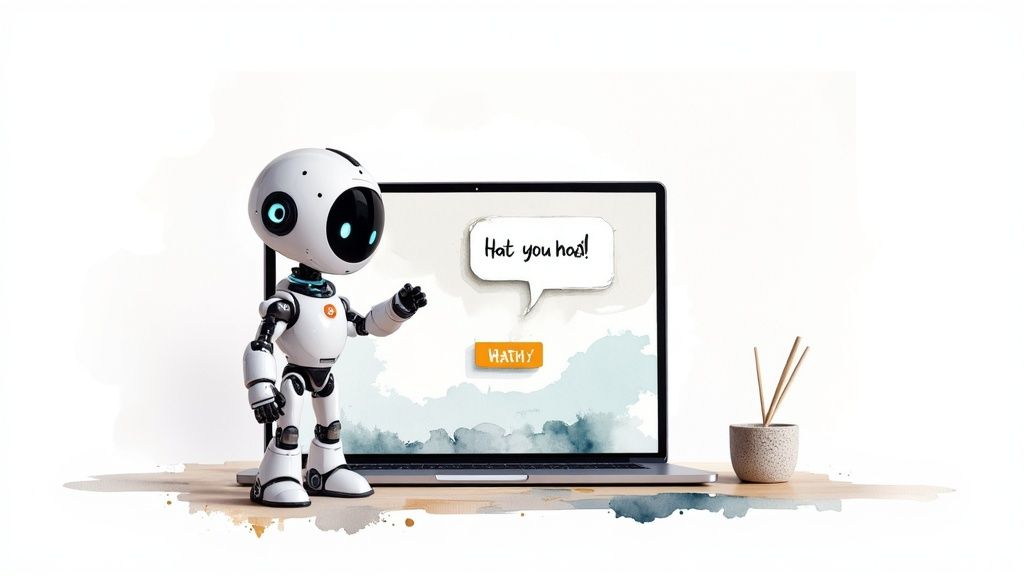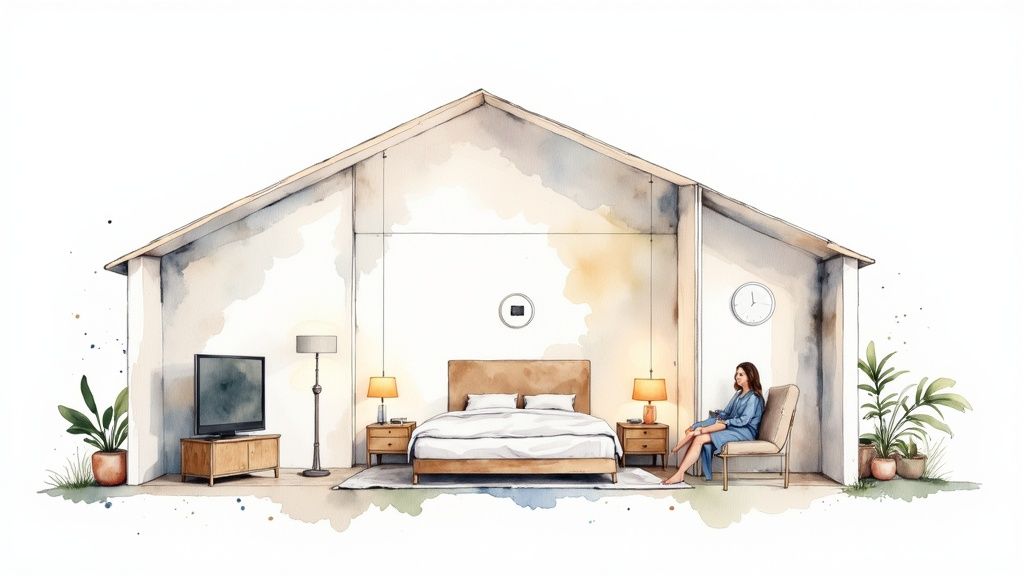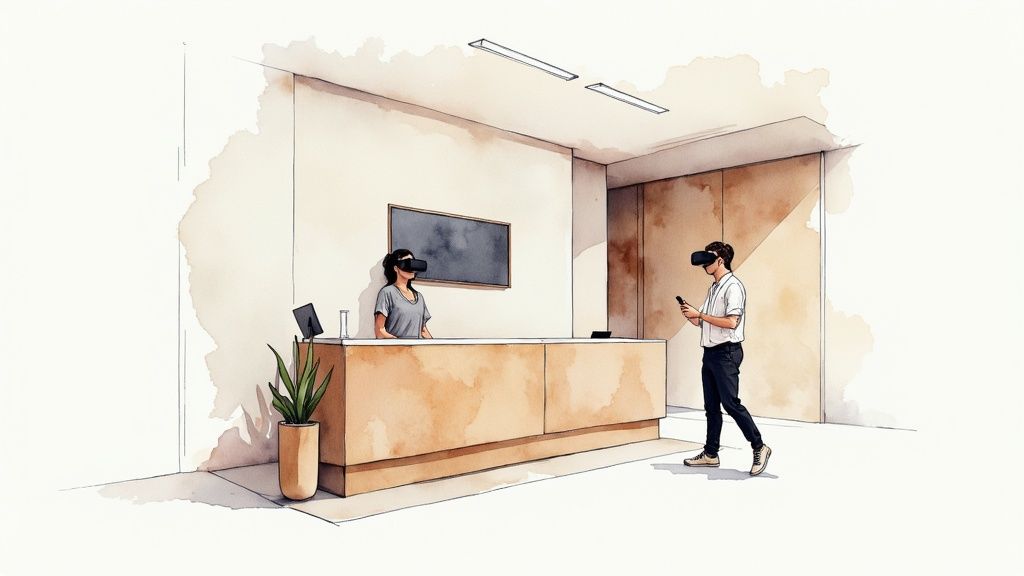Your Hotel's Tech is a Joke. Let's Fix It.
Explore the latest hospitality industry technology trends shaping 2025. Stay ahead with insights on innovative solutions and industry advancements.
Posted by
Alright, let’s cut the crap. You’re busy. I’m busy. And we’ve both sat through enough keynotes telling us to 'delight our guests.' What a waste of oxygen. The hard truth nobody says out loud? Your guests don’t know what they want until you show them. Henry Ford never asked for a faster horse, and Steve Jobs didn't run a focus group for the iPhone. Your job isn't to be an order-taker; it's to see the future and drag your property into it, kicking and screaming if you have to.
Ignore the hospitality industry technology trends shaping guest expectations, and you’ll be lucky to survive the quarter. The game is no longer about better service; it's about seamless, predictive, and frictionless experiences powered by tech that works so well it becomes invisible. Trying to compete without it is like bringing a flip phone to a board meeting: you’re not just behind, you're irrelevant. This isn't a friendly guide filled with generic advice. It's a field manual for survival. For a detailed exploration of what's shaping the future of the sector, consider the Top Hospitality Industry Technology Trends for 2025 as a complementary resource.
Read it, argue with it, but for god's sake, don't ignore it. Let's get to work.
1. Contactless Tech: Your New Front Desk is a Liability
Remember when a warm smile at check-in was the gold standard? Cute. The best welcome now is no welcome at all, at least not in person. Guests want to walk past your front desk like it's a museum piece, unlock their door with their phone, and never speak to a human unless the room is on fire. This isn't about being antisocial; it's about eliminating friction.
The hotels still forcing people to line up for a plastic key card are the same ones wondering why their repeat business is tanking. They aren't just losing to competitors; they're losing to convenience itself. Implementing robust contactless visitor sign-in solutions isn’t an option; it's table stakes.
Founder's Takeaway: Your lobby is a bottleneck, not a feature. Automate the transaction so your team can focus on the human connection that actually matters.
2. AI & Chatbots: Stop Paying People to Be a FAQ Page
Think your staff can answer "what time is checkout?" for the thousandth time with a genuine smile? Stop kidding yourself. Guests don't want to call the front desk for basic info any more than your team wants to answer it. They want instant answers, and AI-powered chatbots deliver exactly that, freeing up your humans for problems that actually require a pulse.

Ignoring this isn't just falling behind; it's actively choosing to provide a slower, less efficient service, which is a death sentence in today's market. Properly implemented, AI is a game-changer for understanding what customer experience management is and executing it flawlessly.
Founder's Takeaway: Automate repetitive queries so your staff can create memorable experiences your guests will actually talk about.
3. IoT & Smart Rooms: Your Rooms Should Work for You
Smart rooms aren't a gimmick; they're your new efficiency engine. A room that knows when a guest leaves, automatically dims the lights, and adjusts the thermostat to save energy. A maintenance alert is triggered when a lightbulb is about to die. This is IoT: creating a network that elevates guest comfort and slashes your operational costs.

Hotels clinging to manual thermostats and dumb TVs are bleeding money through inefficiency. They're selling a room, while competitors are selling a seamless, responsive environment. This shift from static rooms to dynamic ecosystems is one of the most transformative hospitality industry technology trends out there.
Founder's Takeaway: Stop thinking of your rooms as static assets. Turn them into intelligent environments that cut costs and create experiences guests pay more for.
4. Cloud-Based PMS: Your Server Closet is an Anchor
Still running your hotel on a server humming away in a dusty back office? You might as well be using a rotary phone to take reservations. Moving to the cloud isn't an upgrade; it’s a survival tactic. It means your data isn't trapped in one building, your staff can manage operations from anywhere, and you stop paying for obsolete software.

On-premise systems are a liability. They are expensive to maintain, a nightmare to update, and a security risk waiting to happen. Cloud-based PMS platforms aren't just a trend; they represent a fundamental shift in how properties are managed.
Founder's Takeaway: Your on-premise server is an anchor, not a foundation. Cut the chain and give your business the freedom to actually scale.
5. Dynamic Pricing: Stop Guessing and Start Selling
Setting room rates based on "the season" is like trying to navigate a highway blindfolded. You're going to crash. The market doesn't care about your calendar; it cares about a thousand micro-factors happening right now, from a local concert to a competitor's flash sale. Relying on gut feelings is a slow, painful way to bleed out revenue.
Advanced revenue management systems are no longer a luxury; they are the bare minimum for survival. These AI-driven platforms analyze everything from competitor pricing to flight schedules, adjusting your rates in real-time to capture maximum profit. Ignoring this is like showing up to a Formula 1 race in a golf cart.
Founder's Takeaway: Your gut is a liar. Stop guessing your prices and let a machine do the math you can't.
6. Voice Tech: The Future is Conversational
Remember telling guests to dial "0" for the front desk? Quaint. Today's guests would rather talk to a speaker in their room than a person on the phone. They want to ask for extra towels or set a wake-up call without picking up a device. This isn't about laziness; it's about immediacy.
The hotel that still relies on a printed binder of services is the same one wondering why guest engagement scores are flatlining. They’re losing to the ambient, voice-first world their guests live in every day, making voice one of the most transformative hospitality industry technology trends to watch.
Founder's Takeaway: Stop making guests search for information. Let them ask for it.
7. AR & VR: Sell the Experience, Not Just the Room
Selling a room with 2D photos is like selling a car without a test drive. You’re asking for a massive leap of faith. AR and VR close that imagination gap, letting guests "try before they buy" by virtually standing in a suite or seeing the ocean view from the balcony. It's the ultimate upgrade to your digital brochure.
Hotels that think this is sci-fi are already losing bookings to properties that let guests virtually tour their property. This tech directly attacks booking hesitation and boosts conversion by showcasing your property's true value in a way static images never can.
Founder's Takeaway: Stop telling guests how great your property is. Use AR/VR to show them, and let them sell themselves.
8. Biometrics: The Guest is the Key
Think your unique room key is secure? It’s a piece of plastic anyone can pick up. Biometrics asks a better question: what if the guest is the key? Facial recognition and fingerprint scanning aren't just for sci-fi movies anymore; they're for eliminating friction. From checking in with a glance to accessing the spa with a touch, this is about making the guest experience both hyper-secure and effortlessly smooth.
Hotels clinging to manual ID checks are burning staff hours on a process a camera can do better and faster. This is one of the most powerful hospitality industry technology trends for properties that value both security and seamless service.
Founder's Takeaway: Stop treating security as a hurdle for your guests. Make it an invisible, frictionless part of their stay.
9. Sustainable Tech: Green is the New Black (Ink)
Thinking "going green" is just about saving the planet is a rookie mistake. It's about saving your P&L. Guests, especially younger ones, are actively choosing hotels that aren’t destroying the environment. Meanwhile, your energy and water bills are silently eating your margins. Sustainable tech isn’t a hippie fantasy; it's a competitive weapon.
Ignoring this trend is like leaving all the lights on in an empty hotel. You're burning cash for no reason. Your eco-friendly policies directly influence your online reviews, and you can explore how reputation management can amplify that positive sentiment.
Founder's Takeaway: Sustainability isn't a cost center; it's a profit driver. Every watt you save drops straight to your bottom line.
10. Modern Payments: Make It Easy to Give You Money
Remember when "cash or credit" was the only question? That's ancient history. Today's guests expect to pay with a tap of their phone, watch, or even crypto. Refusing to adapt is a slow-motion surrender. You're either streamlining the final guest interaction or making it a point of friction.
The properties that still fumble with clunky credit card terminals will be collecting dust in a few years. They're losing to the sheer convenience of Apple Pay and Google Pay. Don't forget, this is another ideal opportunity to ask for feedback, as detailed in this guide on how to get customer feedback.
Founder's Takeaway: Your payment terminal is the last impression you leave. Make it fast, secure, and modern, or it will be the last time they pay you.
Hospitality Tech Trends: Key Feature Comparison
| Technology | Implementation Complexity 🔄 | Resource Requirements ⚡ | Expected Outcomes 📊 | Ideal Use Cases 💡 | Key Advantages ⭐ |
|---|---|---|---|---|---|
| Contactless Technology and Mobile Check-in/Check-out | Moderate - requires robust IT and staff training | Moderate - mobile apps, kiosks, network infrastructure | Improved guest safety, efficiency, convenience | Hotels prioritizing hygiene and quick service | Enhanced hygiene, cost reduction, 24/7 service |
| Artificial Intelligence and Chatbots | High - complex AI development and maintenance | High - AI platforms, continuous updates | Instant customer support, reduced workload | Customer service automation, multilingual support | 24/7 availability, personalized responses |
| Internet of Things (IoT) and Smart Room Technology | High - integration of multiple devices and systems | High - IoT devices, network infrastructure | Personalized guest comfort, energy savings | Luxury and tech-forward hotels | Guest personalization, operational efficiency |
| Cloud-Based Property Management Systems (PMS) | Moderate - migration and integration phases | Moderate - cloud subscriptions and training | Scalable management, real-time data access | Properties seeking flexible, remote management | Scalability, automatic updates, mobility |
| Revenue Management and Dynamic Pricing Systems | High - requires specialized training and setup | Moderate to high - AI data analytics tools | Optimized pricing, increased revenue | Hotels focused on maximizing RevPAR and demand | Revenue maximization, quick market response |
| Voice Technology and Smart Speakers | Moderate - system integration and guest training | Moderate - smart devices, network setup | Hands-free guest interaction, enhanced accessibility | Hotels enhancing guest convenience and tech appeal | Intuitive control, 24/7 service, accessibility |
| Augmented Reality (AR) and Virtual Reality (VR) | High - content creation and system deployment | High - AR/VR hardware and development costs | Immersive experiences, improved booking conversions | Marketing, guest engagement, staff training | Memorable experiences, better booking rates |
| Biometric Technology and Facial Recognition | High - requires advanced security and compliance | High - biometric hardware and data security | Enhanced security, streamlined check-in/out | Hotels focusing on security and personalization | Security, convenience, fraud prevention |
| Sustainable Technology and Energy Management | High - integration with existing infrastructure | Moderate to high - sensors, renewable tech | Reduced costs, lower environmental impact | Eco-conscious hotels and regulatory compliance | Cost savings, brand reputation, regulatory compliance |
| Mobile Payment and Cryptocurrency Integration | Moderate - requires payment system integration | Moderate - payment terminals, staff training | Faster transactions, increased payment options | Properties catering to tech-savvy and global guests | Payment convenience, reduced contact, security |
Your Next Move is Obvious
So, there you have it. Ten massive shifts in hospitality industry technology trends. You can look at this list and feel overwhelmed. Don't. That's a trap. This isn't a checklist to be completed by Q4; it's a playbook for survival.
The single thread connecting every one of these trends isn't the tech itself. It’s the relentless removal of friction.
- Contactless Check-in? Removes the friction of waiting in line.
- AI Chatbots? Removes the friction of waiting for an answer at 2 AM.
- Smart Rooms? Removes the friction of fumbling for a light switch.
- Mobile Payments? Removes the friction of pulling out a wallet.
Your job isn't to become a tech expert. It's to become a friction-hunter. Stop clinging to "the way we've always done it." That phrase is a eulogy for a dying business. The hotels that win the next decade won't have the best lobby art. They will be the most ruthlessly efficient at delivering a seamless experience.
Your mandate is clear. Pick one area. Find the biggest point of friction in your guest journey and declare war on it. Use one of these technologies as your weapon. Master it, measure the impact, then move to the next target. This is how you build a future-proof operation. The choice to evolve or be left behind is, as always, yours.
Stop guessing what your guests hate and let Backsy show you the raw, unfiltered truth hidden in your reviews so you can fix what's actually broken.